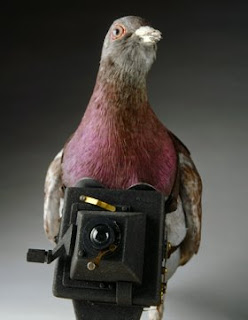
Click picture to hear podcast!


The image to the left is of a reconnaissance pigeon. These pigeons were once used during WWI as a means of spying. This was first developed in 1903 by German engineer Julius Neubronner. The camera was ridged with a timer which would systematically snap photos when the bird was in flight.
It all started with a note tied to the foot of the pigeon and has now evolved to Blojects. Blogjects, for the those of you who don't know, are any object that can be connected to the Internet and streaming any information that object may encounter. The first study involves a device attached to pigeons which measured air pollution in LA. It also used a GPS system to track the birds flight. The information measured on the mounted device would be streamed directly to the Internet, like a blog.
I found this to be amazing just think what scientist can do with this. They can ultimately share all their information to the public allowing i different kind of information flow. Just think whale migrations, your cat/dog, and any other species you can possibly think of. People can make their own conjectures. For instance, we can actually see the air pollution And just think about what this could do for the spy world.
Their is a current deer blogging. His name is "Thor" and he blogs every 5 minutes by sharing his GPS location with all of us. This blogject could be used by rangers, biologist, meteorologist, etc. If you can image seeing what your hunting season could look like. By tagging one or a couple you could see what their patterns may be over a years time. One might argue, well scientist already do that. But their information is not available to all of us, and certainly not in a timely fashion. Just imagine how valuable this could be to a journalist, he could literally be pitched this story by a deer and it could be timely, valuable, and novel.
The rhetoric of a green generation mainly focusing on lifestyles. Social media in web 2.0